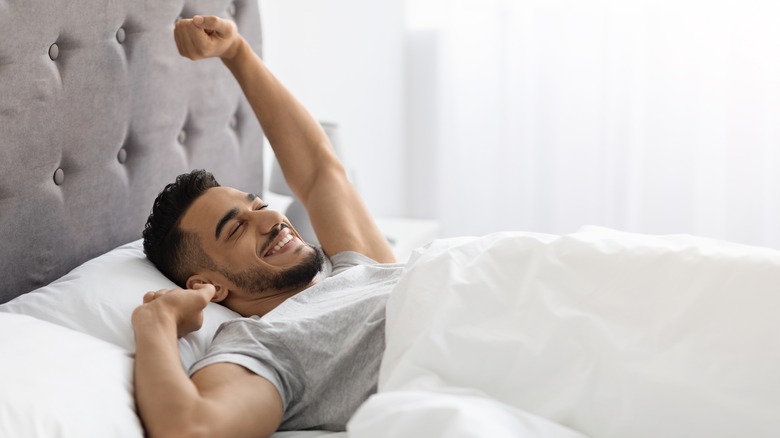How A Weekend Nap Can Help You Make The Most Of Your Waking Hours
If you find yourself struggling to roll out of bed bright and early Monday morning, you're one of many.
Findings from a 2017 international survey issued by YouGov on behalf of the meditation products company Calm, revealed that out of more than 4,200 Americans and Britons polled, the majority of participants reported getting the worst quality sleep on Sunday night. With nearly one-quarter of survey respondents voting Sunday as their worst night of sleep out of the week, Thursday proved to be the most fruitful night, with only 2% of participants reporting difficulty sleeping.
Offering an explanation for these findings, Dr. Steve Orma, clinical psychologist, insomnia specialist, and contributor to Calm's Sleep Stories collection, explains how weekend activities often throw off our weekday sleep habits. "Many people go to bed later on Friday and Saturday nights and then sleep in later on Saturday and Sunday mornings. So, when they go to bed on Sunday night, they're often just not tired," Dr. Orma tells Calm. Combine that with the rumination that sets in once we realize we're struggling to sleep, and it's a recipe for a miserable Monday morning.
What is social jetlag?
When weekend activities, such as work, classes, or social outings, cause us to stray from our routine weekday sleep patterns, the result is a term known as social jetlag (SJL). A 2021 scientific review published in Nutrients outlines how social jetlag acts in direct opposition to our natural circadian rhythms, or human sleep-wake cycle. This phenomenon has been observed around the world. So much so, that approximately 70% of people in industrialized countries regularly experience at least one hour or more of social jetlag. Furthermore, those who work or attend school often endure social jetlag for years.
Over time, research has shown that social jetlag may potentially impact our health in the long run. Those who experience ongoing social jetlag may be more susceptible to diabetes, cardiovascular disease, obesity, cancer, Alzheimer's disease, and more.
Thankfully, even if a new season of your favorite reality show keeps you up later than usual this weekend, it doesn't necessarily mean that we're doomed for a groggy start to the week. Rather, letting your head hit the pillow for a quick catnap over the weekend may be just the thing to help you make the most of your Monday morning.
Tips for using weekend naps to your advantage
The benefits of naps aren't just for young children. Rather, the Sleep Foundation reports that naps can be effective at combating drowsiness during waking hours, enhancing workplace performance, and boosting memory, logical reasoning, alertness, and more. In terms of physical health benefits, naps have also been linked with increased immune health, endurance, and a reduced risk of heart disease.
So how should we use weekend naps to our advantage when it comes to staving off social jetlag? If you're one of the many people who struggle with sleep on Sunday nights, taking a short nap on Saturday or Sunday afternoons can help you feel refreshed come Monday morning. However, the timing of these weekend naps is key. Make sure your nap doesn't exceed 30 minutes and keep it between the hours of 12 p.m. and 4 p.m. as to not negatively impact your nightly sleep (via Vox). Additionally, ensure you're setting yourself up for success by snoozing in a dark, cool environment free of noisy disruptions. Blackout curtains or an eye mask can help with this. By using these tips, you may find rolling out of bed Monday morning may not be so difficult after all.



